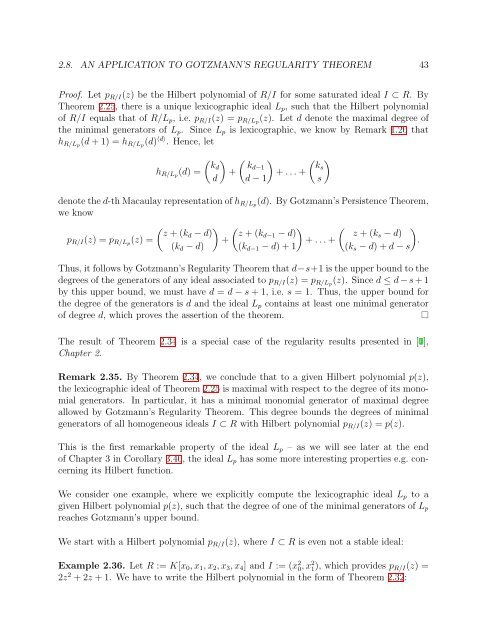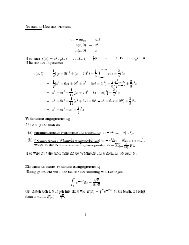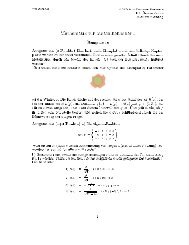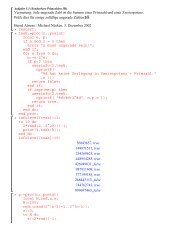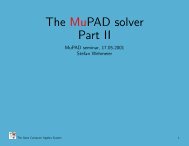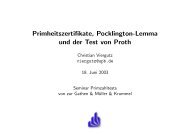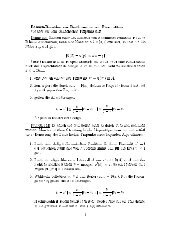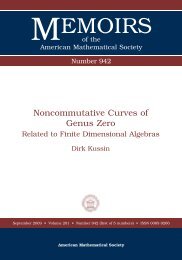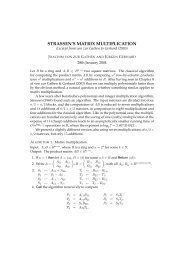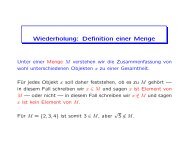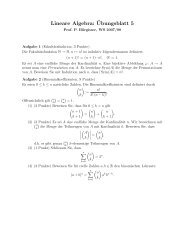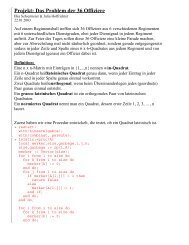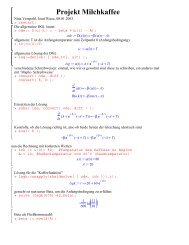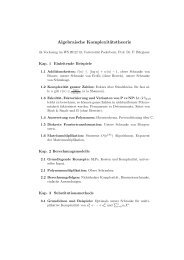University of Paderborn Department of Mathematics Diploma Thesis ...
University of Paderborn Department of Mathematics Diploma Thesis ...
University of Paderborn Department of Mathematics Diploma Thesis ...
Create successful ePaper yourself
Turn your PDF publications into a flip-book with our unique Google optimized e-Paper software.
2.8. AN APPLICATION TO GOTZMANN’S REGULARITY THEOREM 43Pro<strong>of</strong>. Let p R/I (z) be the Hilbert polynomial <strong>of</strong> R/I for some saturated ideal I ⊂ R. ByTheorem 2.25, there is a unique lexicographic ideal L p , such that the Hilbert polynomial<strong>of</strong> R/I equals that <strong>of</strong> R/L p , i.e. p R/I (z) = p R/Lp (z). Let d denote the maximal degree <strong>of</strong>the minimal generators <strong>of</strong> L p . Since L p is lexicographic, we know by Remark 1.20 thath R/Lp (d + 1) = h R/Lp (d) 〈d〉 . Hence, leth R/Lp (d) =( ) ( )kd kd−1+ + . . . +d d − 1( )kssdenote the d-th Macaulay representation <strong>of</strong> h R/Lp (d). By Gotzmann’s Persistence Theorem,we know( ) ( ) ( )z + (kd − d) z + (kd−1 − d)z + (ks − d)p R/I (z) = p R/Lp (z) =++ . . . +.(k d − d) (k d−1 − d) + 1(k s − d) + d − sThus, it follows by Gotzmann’s Regularity Theorem that d−s+1 is the upper bound to thedegrees <strong>of</strong> the generators <strong>of</strong> any ideal associated to p R/I (z) = p R/Lp (z). Since d ≤ d − s + 1by this upper bound, we must have d = d − s + 1, i.e. s = 1. Thus, the upper bound forthe degree <strong>of</strong> the generators is d and the ideal L p contains at least one minimal generator<strong>of</strong> degree d, which proves the assertion <strong>of</strong> the theorem.The result <strong>of</strong> Theorem 2.34 is a special case <strong>of</strong> the regularity results presented in [1],Chapter 2.Remark 2.35. By Theorem 2.34, we conclude that to a given Hilbert polynomial p(z),the lexicographic ideal <strong>of</strong> Theorem 2.25 is maximal with respect to the degree <strong>of</strong> its monomialgenerators. In particular, it has a minimal monomial generator <strong>of</strong> maximal degreeallowed by Gotzmann’s Regularity Theorem. This degree bounds the degrees <strong>of</strong> minimalgenerators <strong>of</strong> all homogeneous ideals I ⊂ R with Hilbert polynomial p R/I (z) = p(z).This is the first remarkable property <strong>of</strong> the ideal L p – as we will see later at the end<strong>of</strong> Chapter 3 in Corollary 3.40, the ideal L p has some more interesting properties e.g. concerningits Hilbert function.We consider one example, where we explicitly compute the lexicographic ideal L p to agiven Hilbert polynomial p(z), such that the degree <strong>of</strong> one <strong>of</strong> the minimal generators <strong>of</strong> L preaches Gotzmann’s upper bound.We start with a Hilbert polynomial p R/I (z), where I ⊂ R is even not a stable ideal:Example 2.36. Let R := K[x 0 , x 1 , x 2 , x 3 , x 4 ] and I := (x 2 0, x 2 1), which provides p R/I (z) =2z 2 + 2z + 1. We have to write the Hilbert polynomial in the form <strong>of</strong> Theorem 2.32:


